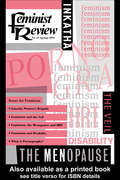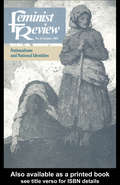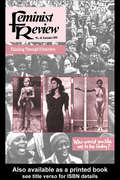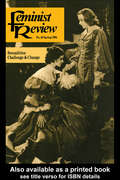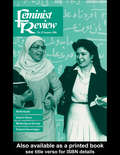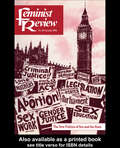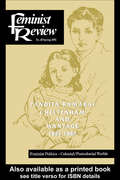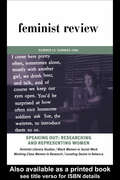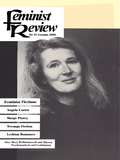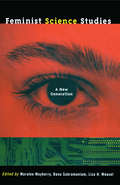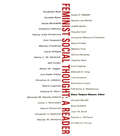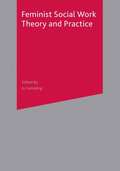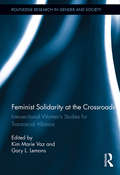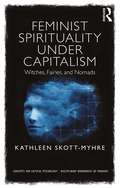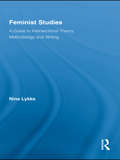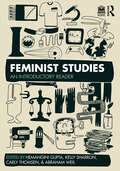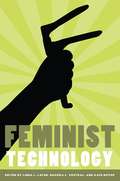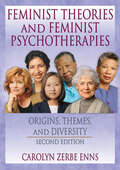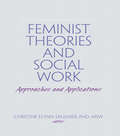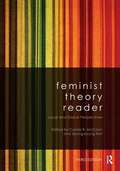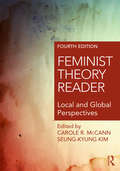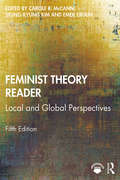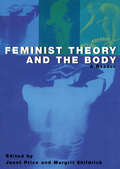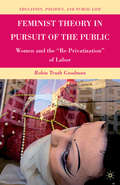- Table View
- List View
Feminist Review: Issue 43: Issues for Feminism
by Kum-Kum Bhavnani, Sue O'Sullivan and Ann Marie WolpeIn this issue each article addresses a topical and controversial theme in contemporary feminist debate: pornography, the veil, HRT, disability and the Inkatha Women's Brigade.
Feminist Review: Issue 44: Nationalisms and National Identities
by Kum-Kum Bhavnani, Sue O’Sullivan and Ann Marie WolpeFeminist Review is the UK's leading feminist journal. It has a unique place in the women's movement internationally. This issue focusing on Nationalism and National Identities features articles by Nahid Yegeneh and Catherine Hall.
Feminist Review: Issue 45: Thinking Through Ethnicities
by Kum-Kum Bhavnani Ann Marie WolpeFocuses on feminist analyses of race and ethnicity - currently one of the most immediate issues facing feminist thinking. The volume ranges from a study of the social geographes of whiteness in the USA to a variety of perspectives on the break-up in Yugoslavia.
Feminist Review: Issue 46
by The Feminist The Feminist Review CollectiveA unique combination of the activist and the academic, Feminist Review has an acclaimed place within women's studies courses and the women's movement. Feminist Review is produced by a London-based editorial collective and publishes and reviews work by women; featuring articles on feminist theory, race, class and sexuality, women's history, cultural studies, Black and Third World feminism, poetry, photography, letters and much more. Feminist Review is available both on annual subscription and from bookstores. For a Free Sample Copy or for further subscription details please contact: Trevina Johnson, Routledge Subscriptions, ITPS Ltd, Cheriton House, North Way, Andover SP10 5BE. UK.
Feminist Review: Issue 47
by Kum-Kum Bhavnani Ann Marie WolpeA unique combination of the activist and the academic, Feminist Review has an acclaimed place within women's studies courses and the women's movement. Feminist Review is produced by a London-based editorial collective and publishes and reviews work by women; featuring articles on feminist theory, race, class and sexuality, women's history, cultural studies, Black and Third World feminism, poetry, photography, letters and much more. Feminist Review is available both on subscription and from bookstores. For a Free Sample Copy of further subscription details please contact Trevina Johnson, Routledge Subscriptions, ITPS Ltd., Cheriton House, North Way, Andover SP10 5BE, UK.
Feminist Review: Issue 48: The New Politics of Sex and the State
by Unknown AuthorA unique combination of the activist and the academic, Feminist Review has an acclaimed place within women's studies courses and the women's movement. Feminist Review is produced by a London-based editorial collective and publishes and reviews work by women; featuring articles on feminist theory, race, class and sexuality, women's history, cultural studies, Black and Third World feminism, poetry, photography, letters and much more. Feminist Review is available both on subscription and from bookstores. For a Free Sample Copy or further subscription details please contact Trevina Johnson, Routledge Subscriptions, ITPS Ltd., Cheriton House, North Way, Andover SP10 5BE, UK.
Feminist Review: Issue 49 Feminist Politics: Colonial/Postcolonial Worlds
by Kum-Kum Bhavnani; Ann Marie WolpeA unique combination of the activist and the academic, Feminist Review has an acclaimed place within women's studies courses and the women's movement. Feminist Review is produced by a London based editorial collective and publishes and reviews work by women; featuring articles on feminist theory, race, class and sexuality, women's history, cultural studies, black and third world feminism, poetry, photography, letters and much more. Feminist Review is available both on subscription and from bookstores. For a Free Sample Copy or further subscription details please contact Terry Sleight, Routledge Subscriptions, ITPS Ltd., Cheriton House, North Way, Andover SP10 5BE, UK.
Feminist Review: Issue 53: Speaking Out: Researching and Representing Women
by The Feminist The Feminist Review CollectiveA unique combination of the activist and the academic, Feminist Review has an acclaimed position within women's studies courses and the women's movement. It publishes and reviews work by women; featuring articles on feminist theory, race, class and sexuality, women's history, cultural studies, black and third world feminism, poetry, photography, letters and much more.
Feminist Review: Issue 54: Contesting Feminist Orthodoxies
by The Feminist The Feminist Review CollectiveA unique combination of the activist and the academic, Feminist Review has an acclaimed position within women's studies courses and the women's movement. It publishes and reviews work by women; featuring articles on feminist theory, race, class and sexuality, women's history, cultural studies, black and third world feminism, poetry, photography, letters and much more.
Feminist Review: Issue No. 33
by Marge Piercy Angela Carter Teenage Fiction Lesbian RomanceFR continues to challenge the subjects of the day, this issue features a lead article on Perestroika and Prostitution
Feminist Science Studies: A New Generation
by Mayberry Maralee Subramaniam Banu Weasel Lisa H.This essential text contains contributions from a wide range of fields and provides role models for feminist scientists. Including chapters from scientists and feminist scholars, the book presents a wide range of feminist science studies scholarship-from autobiographical narratives and experimental and theoretical projects, to teaching tools and courses and community-based projects.
Feminist Social Thought: A Reader
by Diana Tietjens MeyersFirst published in 1998. Routledge is an imprint of Taylor & Francis, an informa company.
Feminist Social Work Theory and Practice
by Lena DominelliFeminist theories of social work have been criticised in recent years for treating women as a uniform category and displaying insufficient sensitivity to the complex ways in which other social divisions (those of race, age, disability, etc. ) impact on gender relations. This major text by a leading writer in the field seeks to develop a new framework for feminist social work that takes on board postmodernist arguments to do with difference and power yet retains a commitment to collective solidarity and social change. As such, it will be essential reading for students, educators and practitioners alike in social work.
Feminist Solidarity at the Crossroads: Intersectional Women’s Studies for Transracial Alliance (Routledge Research in Gender and Society)
by Kim Marie Vaz Gary L. LemonsWomen’s studies programs and departments face ongoing fall-out from an economic crisis in higher education. Taking the form of budget-cuts, reduction of faculty lines and other resource allocations, for some programs and departments it has meant at best, a loss of disciplinary autonomy through consolidation, and at worst, academic foreclosure. Feminist Solidarity at the Crossroads articulates a politics of commitment, hope, and possibility wrought in the coming-together of a group of feminist women and men—across racial, cultural, nation/state, sexual, and gender differences—during a tough budgetary time threatening Women’s Studies programs across the nation. This anthology affirms the continued necessity of bridge-building alliances in women’s studies and contemplates with promise the theory and practice of feminist solidarity forged through the course of its production. While the essays in this book display a complex diversity of feminist thought and modes of intersectional strategies, they reflect a unity of comradery and a spirit of collectivity so necessary for these turbulent times.
Feminist Spirituality under Capitalism: Witches, Fairies, and Nomads
by Kathleen Skott-MyhreIndustrial modernity's worship of rationality had a profound effect on women’s ways of knowing, marginalizing them along with other alternate forms of knowledge such as the imagination and the unconscious. Feminist Spirituality under Capitalism discusses the importance of women’s spiritual knowledge throughout history and under the current socio-economic consensus. Within a critical analysis of the subjugation of certain knowledges, it investigates in particular the role that psychology and psychiatry have played in the repression of women. Aimed at students and researchers in the social sciences, the book will also appeal to anyone interested in critical psychology, politics, activism and social change.
Feminist Studies: A Guide to Intersectional Theory, Methodology and Writing (Routledge Advances in Feminist Studies and Intersectionality)
by Nina LykkeIn this book, feminist scholar Nina Lykke highlights current issues in feminist theory, epistemology and methodology. Combining introductory overviews with cutting-edge reflections, Lykke focuses on analytical approaches to gendered power differentials intersecting with other processes of social in/exclusion based on race, class, and sexuality. Lykke confronts and contrasts classical stances in feminist epistemology with poststructuralist and postconstructionist feminisms, and also brings bodily materiality into dialogue with theories of the performativity of gender and sex. This thorough and needed analysis of the state of Feminist Studies will be a welcome addition to scholars and students in Gender and Women’s Studies and Sociology.
Feminist Studies: An Introductory Reader (xx xx)
by Carly Thomsen Hemangini Gupta Kelly Sharron Abraham WeilFeminist Studies: An Introductory Reader offers a unique approach to teaching and learning feminist thought.Crafted with the movement and translation of ideas in mind, this book is broken into four sections: Feminist Epistemologies, Feminist Ontologies, Feminist Orientations, and Resistance. Each chapter includes two well-known classic texts that commonly appear in Feminist Studies classes as well as two new texts written by scholars who engage, critique, and extend those ideas in their work. In addition, the book is accompanied by a companion website, which includes discussion questions, assignment ideas, lesson plans, and other materials useful for classroom instruction.Feminist Studies: An Introductory Reader is designed for those new to feminism as well as more seasoned feminist thinkers. It is an ideal resource for students in introductory and advanced feminist theory courses, as well as those interested in social scientific and humanistic inquiry more broadly.
Feminist Technology (Women, Gender, and Technology)
by Linda L. Layne Sharra Vostral Kate BoyerIs there such a thing as a "feminist technology"? If so, what makes a technology feminist? Is it in the design process, in the thing itself, in the way it is marketed, or in the way it is used by women (or by men)? In this collection, feminist scholars trained in diverse fields consider these questions by examining a range of products, tools, and technologies that were specifically designed for and marketed to women. Evaluating the claims that such products are liberating for women, the contributors focus on case studies of menstrual-suppressing birth control pills, home pregnancy tests, tampons, breast pumps, Norplant, anti-fertility vaccines, and microbicides. In examining these various products, this volume explores ways of actively intervening to develop better tools for designing, promoting, and evaluating feminist technologies. Recognizing the different needs and desires of women and acknowledging the multiplicity of feminist approaches, Feminist Technology offers a sustained debate on existing and emergent technologies that share the goal of improving women's lives. Contributors are Jennifer Aengst, Maia Boswell-Penc, Kate Boyer, Frances Bronet, Shirley Gorenstein, Anita Hardon, Deborah G. Johnson, Linda L. Layne, Deana McDonagh, and Sharra L. Vostral.
Feminist Theories and Feminist Psychotherapies: Origins, Themes, and Diversity, Second Edition
by J Dianne Garner Carolyn Z EnnsAn updated, reader-friendly guide to feminist theory and therapy! Feminist Theories and Feminist Psychotherapies: Origins, Themes, and Diversity, Second Edition examines major feminist theoretical perspectives and links them to practical applications of feminist therapy. This book focuses on the evolution of feminist therapy and how histor
Feminist Theories and Social Work: Approaches and Applications
by Christine Flynn SaulnierThis invaluable guidebook accomplishes what many others on feminist theory do not. It reviews both the theories and the applications of the field. Too frequently, books and articles tend to focus on one or two ways for practicing feminism, when, in reality, different problems, different groups of women, and different goals may require a different theory for guiding objectiveness, strategies, and work style. Using the wrong theory for a particular group or problem may backfire, causing unexpected outcomes. This book circumvents such unforeseen results. Feminist Theories and Social Work reviews the most important theories of today, evaluates the contributions and limitations of each branch, and for each theory, provides application examples at several levels of intervention.
Feminist Theory Reader
by Seung-Kyung Kim Carole MccannThe third edition of the Feminist Theory Reader anthologizes the important classical and contemporary works of feminist theory within a multiracial transnational framework. This edition includes 16 new essays; the editors have organized the readings into four sections, which challenge the prevailing representation of feminist movements as waves. Introductory essays at the beginning of each section lay out the framework that brings the readings together and provide historical and intellectual context. Instructors who have adopted the book can email SalesHSS@taylorandfrancis.com to receive test questions associated with the readings. Please include your school and location (state/province/county/country) in the email. Now available for the first time in eBook format 978-0-203-59831-3.
Feminist Theory Reader: Local and Global Perspectives
by Seung-Kyung Kim Carole MccannThe fourth edition of the Feminist Theory Reader continues to challenge readers to rethink the complex meanings of difference outside of contemporary Western feminist contexts. This new edition contains a new subsection on intersectionality. New readings turn readers' attention to current debates about violence against women, sex work, care work, transfeminisms, and postfeminism. The fourth edition also continues to expand the diverse voices of transnational feminist scholars throughout, with particular attention to questions of class. Introductory essays at the beginning of each section bring the readings together, provide historical and intellectual context, and point to critical additional readings. Five core theoretical concepts--gender, difference, women's experiences, the personal is political, and intersectionality--anchor the anthology's organizational framework. New to this edition, text boxes in the introductory essays add excerpts from the writings of foundational theorists that help define important theoretical concepts, and content by Dorothy Sue Cobble, Cathy Cohen, Emi Koyama, Na Young Lee, Angela McRobbie, Viviane Namaste, Vrushali Patil, and Jasbir Puar.
Feminist Theory Reader: Local and Global Perspectives
by Carole R. McCannThe fifth edition of the Feminist Theory Reader assembles readings that present key aspects of the conversations within intersectional US and transnational feminisms and continues to challenge readers to rethink the ways in which gender and its multiple intersections are configured by complex, overlapping, and asymmetrical global–local configurations of power. The feminist theoretical debates in this anthology are anchored by five foundational concepts—gender, difference, women’s experiences, the personal is political, and especially intersectionality—which are integral to contemporary feminist critiques. The anthology continues to center the voices of transnational feminist scholars with new essays giving it a sharper focus on the materiality of gender injustices, racisms, ableisms, colonialisms, and especially global capitalisms. Theoretical discussions of translation politics, cross-border solidarity building, ecofeminism, reproductive justice, #MeToo, indigenous feminisms, and disability studies have been incorporated throughout the volume. With the new essays and the addition of a new editor, the Feminist Theory Reader has been brought fully up-to-date and will continue to be a touchstone for women’s and gender studies students, as well as academics in the field, for many years to come.
Feminist Theory and the Body: A Reader
by Janet Price Margrit ShildrickFirst published in 1999. Routledge is an imprint of Taylor & Francis, an informa company.
Feminist Theory in Pursuit of the Public
by Robin Truth GoodmanArgues that feminism needs to develop a theory of the public responding to a moment when feminism's impetus to reconstitute the private sphere left a huge gap in its political thinking on the public.
